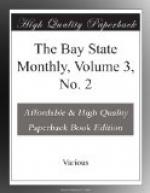The dinner went on. Sir Temple Dacre’s comments were so kind that they could not be offensive. Most of them were made to Elizabeth. He admired Madam Archdale, and thought that her son resembled her; he thought that Colonel Pepperell had the air of a leader of men. “One born so,” he said. “He seems always to know what he means, that’s it, and he doesn’t always tell you. On the whole, perhaps, the last is as great a point, because men don’t take ideas readily; they never half look at them; they have too many crotchets of their own; or if not that, too much thick-headedness. The only way to do is to send out the result of one’s conclusions in the form of an order, and say nothing about how it was come at.”
“You are speaking only of military matters?” she asked.
“Well, no, of things in general.”
“Then it wouldn’t do in our part of the Colonies,” she said. “I once heard of a little boy who was called ‘Whatfor Winship’ because he was perpetually asking the reasons of things. That is like us. We think a great deal of an aristocracy, provided we can all be aristocrats. Everybody is sure that he can decide any matter that comes up, and then from a sense of fairness we put it to vote. That’s the way we manage here.”
“Yes,” answered Sir Temple, “we across the water know that you people are deuced fond of managing—Beg pardon.—But let me tell you what Walpole, our former minister, said one day when I dined with him. ’Going to America, I understand?’ he asked. I said I was. ’Well, I hope over there they’ll let you travel in the way it pleases you, it’s more than they did to our orders; there is such an ado if those people are not handled with velvet gloves, and the thickest velvet we have, too. I would like you to tell me if you can make out what it all means,’ he said.”
“And so you’re taking notes to see what sort of a set we are? One thing, Sir Temple, you’ll find us loyal to our mother, though she does domineer sometimes. And tell Sir Robert that children old enough to contribute to the support of the family, as we do, ought to be allowed to put in a word now and then as to its management.”
Sir Temple looked at her, not having an answer ready and little dreaming that a generation later this truth that the beautiful lips had uttered so simply, yet with a proud curve through their merriment, would be forced upon the English ministry at the point of the bayonet. But he lived to see it. Then he thought more than once of this day, of Elizabeth, with her dignity and her brightness, who had seen into the heart of one of the world’s great struggles and had spoken the thought that later the cannon of a nation thundered through the earth. Now, however, he looked at her without a full idea of her meaning, thinking her only clever, and ready, and a trifle wanting in respect toward the powers that be, and that this lack came from her youth and should be treated with indulgence. It was a woman’s way of looking at things, he said to himself, for he recognized sometimes the same spirit in Lady Dacre.




